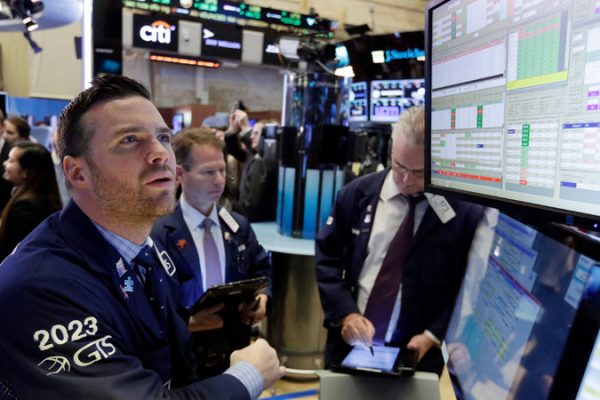
What will happen to financial markets after the election? More so than usual, we have a decent idea.
That’s because there has been a clear and identifiable swing in a variety of asset prices — especially the stock market and currencies — at inflection points in the presidential race. A stock market rally on Monday is the latest evidence. The 2 percent gain in the Standard & Poor’s 500 as of about 2 p.m. appears to be linked to the announcement on Sunday by James Comey, the F.B.I. director, that an examination of newly discovered Hillary Clinton’s emails revealed nothing warranting charges.
Market swings over the course of the election suggest that people and institutions with money on the line view a world with Mrs. Clinton as president offering a less volatile economic and financial environment than one with Donald J. Trump in charge.
It’s a risky game to try to tie swings in financial markets to political news. Markets often rise and fall for reasons that have nothing to do with the day’s biggest headlines. And if Monday’s rally were a one-time occurrence, it would be safer to attribute it to random chance than to the market’s collective judgment of the future under the two potential presidents.
But in this election cycle, there has been a clear pattern around several events where the odds shifted in the race and different financial indicators moved in a consistent direction. Good news for Mrs. Clinton’s campaign has coincided with higher stock prices, a rally in the Mexican peso and a decline in expected stock market volatility. Good news for Mr. Trump has coincided with the reverse swings. (The impact on the value of the dollar and Treasury bonds has been more ambiguous.)
That movement was evident when audio emerged of Mr. Trump making vulgar comments about women and Mrs. Clinton had strong debate performances. It went in the opposite direction when Mr. Comey indicated on Oct. 28 that investigators were examining newly obtained emails tied to Mrs. Clinton.
An analysis around the first debate by the economists Justin Wolfers and Eric Zitzewitz found that the coinciding movements between Mrs. Clinton’s odds and market prices implied that Mr. Trump’s winning would lead to a 10 to 15 percent drop in major stock markets and substantial drops in the price of oil and the Mexican currency, combined with higher volatility. (Mr. Wolfers is a contributor to The Upshot).
Stock market analysts agree on the direction of the likely movements in the event of a Trump win, if not their magnitude. In a research note Monday, Evercore I.S.I. interpreted the evidence as signaling that a Trump win would create a drop of 5 to 6 percent in stocks, with a 2 percent gain if Mrs. Clinton wins. Citigroup analysts see a drop of 3 to 5 percent.
“A Democratic sweep could cause investors and corporate leaders to worry about higher taxes and regulation,” wrote Ethan Harris, global economist at Bank of America Merrill Lynch. “A Trump win could have an even greater impact due to uncertainty about how campaign promises translate into policies,” particularly around the risk of trade wars.
Even if estimates like those correctly predict the near-term market reaction to the election, their ability to correctly judge the long-term consequences of a political shift for the economy and the business environment isn’t particularly good. Complex feedback loops among political decisions, public policy and the economy aren’t always evident in the immediate aftermath of elections or referendums.
The June 23 vote by British voters to leave the European Union is a prime example. In the days just after the vote, the British stock market fell sharply, as did the country’s currency. In the weeks that followed, the stock market largely rebounded, as there was no evident damage to British companies’ profitability and the cheaper pound made shares of those companies a bargain. British stocks are now higher than they were the day of the vote, as measured by the FTSE 100 index. The pound has fallen further.
Similarly, a Trump win would set in motion shifts that market analysts can only guess at. Even if the stock market dropped as analysts are forecasting, that might make the Federal Reserve less likely to raise interest rates at its December meeting, which tends to strengthen asset prices.
And investors would surely start to game out which companies stand to gain the most from Mr. Trump’s promises of a lower corporate income tax rate and lighter regulation — and which could suffer from less availability of immigrant labor.
Fundamentally, the tone out of economic and market analysts is that they don’t know exactly how Mr. Trump would govern. Nor do they know the composition of the new Congress and how it would deal with either a Clinton or Trump administration.
A victory by Mrs. Clinton would most likely signal continuity with President Obama’s policies and fewer radical shifts, but there, too, the details of what happens would ultimately shape the fate of markets. And it would depend on other unknowable details, like whether she finds willing partners to enact pieces of her agenda or faces steadfast resistance from Congress.
In other words, think of the market reaction on Wednesday as a response to one mystery being solved (who won) while another one is created (how that person will lead).
NY TIMES

Leave a Reply
You must be logged in to post a comment.